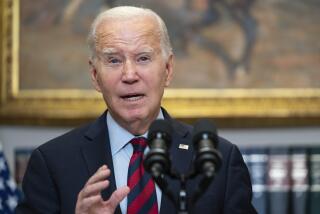All That Soviet Activity at the U.N. Is Something U.S. May Need to Match
- Share via
The next President is likely to begin his term with unprecedented Soviet proposals on the negotiating table to strengthen the effectiveness of the United Nations in peacemaking, peacekeeping, dispute settlement and environmental protection.
After four decades of Soviet intransigence in the United Nations and Soviet aggression outside it, one would have to be a “useful idiot” to take all of Mikhail S. Gorbachev’s new rhetoric on international relations at face value. But it would be equally foolish not to recognize that, under Gorbachev, the Soviets have begun to pay their back U.N. dues and cooperate in the resolution of conflicts in Afghanistan, the Persian Gulf area and Africa. Moreover, it is significant that the Soviets’ new rhetoric is not just for foreign consumption; they are saying the same things to their own people through the mass media and scholarly journals, much to the discomfiture of reactionaries like Yegor K. Ligachev, who delivers thunderbolts of old rhetoric whenever he gets a chance.
But what is really new in Moscow are the indications from authoritative spokesmen that, at long last, Gorbachev’s call for “a comprehensive system of international security”--whose grandiosity and vagueness have understandably aroused Western suspicions--will now be followed up with some practical proposals that Western countries can take seriously. These proposals are not very original--indeed, some of them are influenced by discussions with Western governments and non-governmental organizations--but they have the merit of practicality.
To begin with, the Soviets want more active fact-gathering and mediation by theU.N. secretary general to head off emerging crises through “preventive diplomacy.” They propose to create a “hot line” for instant communications between the secretary general and the Security Council’s five permanent members. They want the secretary general and the council to be able to initiate quiet consultations with parties to incipient conflicts, even if no government puts an item on the U.N. agenda.
Second, the Soviets want the United Nations to review its experience with past peacekeeping operations and to adopt measures to ensure that it can meet the future peacekeeping challenges that it may face as part of settlements in Western Sahara, Namibia, Cambodia and elsewhere. The measures would include better preparation of national contingents serving under the U.N. flag, clearer guidelines for the control of peacekeeping operations by the Security Council and the Secretariat, and the use of the now-dormant Military Staff Committee to provide needed technical advice to the secretary general.
The Soviets also want the five permanent members of the Security Council to adopt identical commitments to take certain kinds of disputes to the International Court of Justice. But, recognizing the difficulty of engaging the French and Chinese in such a common initiative, they now seem prepared to explore a bilateral agreement with the United States alone, under which each of our countries would agree to go to the court at the initiative of the other to resolve disputes over the interpretation of specified treaties to which both are parties, and perhaps also for the compulsory resolution of disputes in well-defined areas like sovereign immunity.
Finally, the Soviets want the United Nations to call a conference for as early as1990 or ’91 to launch a strengthened global program for environmental protectionfocusing on ozone depletion, “greenhouse” warming, desertification and deforestation. They also want to explore a charter amendment that would transform the Trusteeship Council, which has run out of dependent territories to oversee, into a body exercising trusteeship responsibilities for our common biosphere.
Foreign Minister Eduard A. Shevardnadze touched on some of those ideas in his address on Tuesday to the General Assembly. But Soviet officials admit that they have not completed their homework on these items; moreover, they may prefer to await the arrival of a new President in Washington before beginning serious negotiations on them. What is clear, however, is that Gorbachev’s new thinking concerning the United Nations is moving from the general to the specific, requiring an American response.
In developing that response we will certainly want to read the fine print in Gorbachev’s initiatives to uncover any booby traps that may be lurking there. For example, we should not agree to any Soviet proposal that would give the Soviet undersecretary a measure of control over the United Nations’ peacemaking or peacekeeping operations. At the same time, we should be willing to take a practical approach, recognizing that even proposals with a Soviet label may be shaped into outcomes in the interest of both superpowers and all U.N. members.
More to Read
Get the L.A. Times Politics newsletter
Deeply reported insights into legislation, politics and policy from Sacramento, Washington and beyond. In your inbox twice per week.
You may occasionally receive promotional content from the Los Angeles Times.










